数据库入门(SQL SEVER)之SQL语句删除单行数据,所有行数据,表和数据库
Posted 梦醒了※
tags:
篇首语:本文由小常识网(cha138.com)小编为大家整理,主要介绍了数据库入门(SQL SEVER)之SQL语句删除单行数据,所有行数据,表和数据库相关的知识,希望对你有一定的参考价值。
1 删除单行数据
2 删除所有行数据
3 删除表和数据库
一:在该页面上直接单击右键选择删除
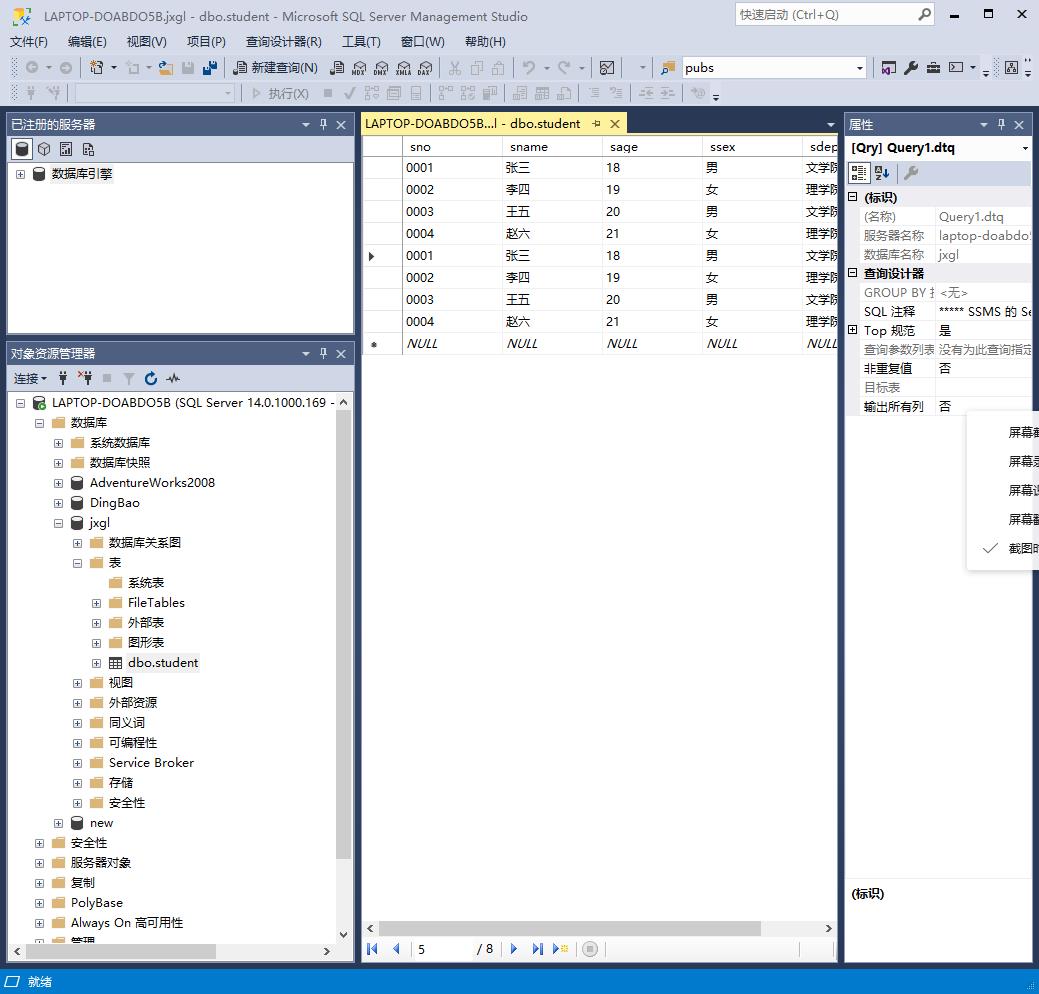
1.2选择 数据库->SSMSTest->表,右键单击直接删除整个表,连带着数据也删除了。不过要注意表有没有外键约束,有的话不能删除主表。欲删主表,先删子表。
二:通过SQL语句实现删除
2.1删除单行数据
SQL语句delete的语法如下:
DELETE FROM 表名称 WHERE 列名称 = 值
例如:
delete from student where sno = '0001'
步骤:点击新建查询后输入
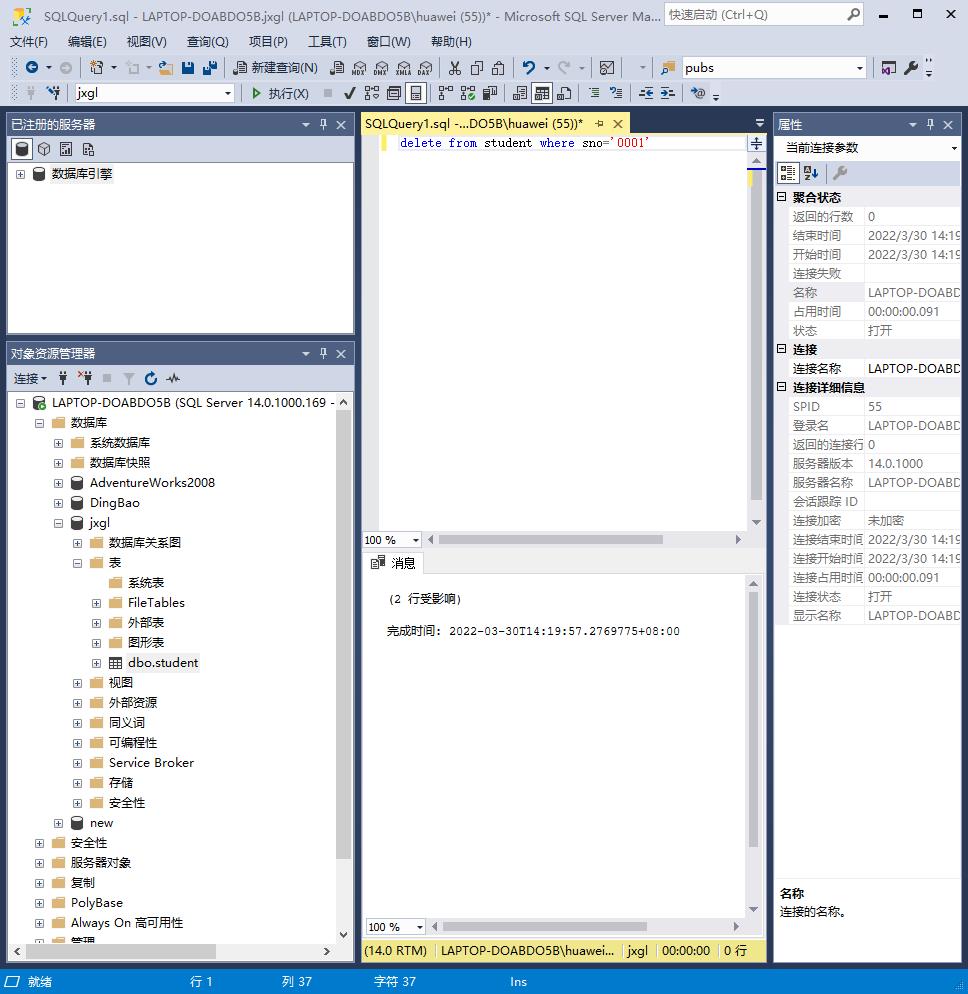
输入后打开student表查看,0001行数据已被删除
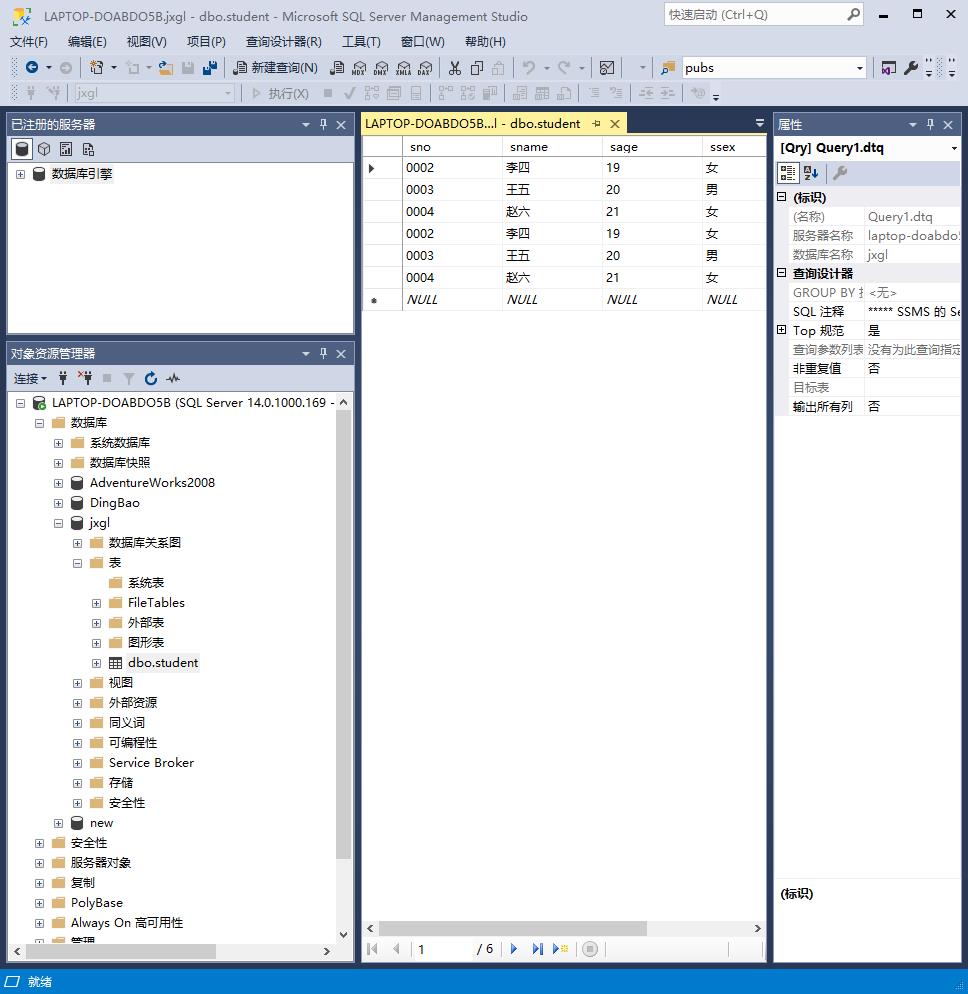
2.2在不删除表的情况下删除所有的行,即表的结构、属性和索引都是完整的,仅改变表中数据内容:
2.2.1SQL语法:
DELETE FROM table_name
或者 DELETE * FROM table_name

点击执行后打开表student,可以看到数据已经被全部删除但表student依然存在
2.3SQL 语句删除表和数据库
2.3.1 语法:
使用DROP INDEX命令删除表格中的索引
DROP INDEX table_name.index_name
3.3.2使用DROP TABLE 语句用于删除表(表的结构、属性以及索引也会被删除):DROP TABLE 表名称
3.3.3使用DROP DATABASE 语句用于删除数据库:DROP DATABASE 数据库名称
3.3.4如果我们仅仅需要除去表内的数据,但并不删除表本身,那么我们该使用TRUNCATE TABLE命令(仅仅删除表格中的数据):
TRUNCATE TABLE 表名称
eg:删除student表的SQL命令
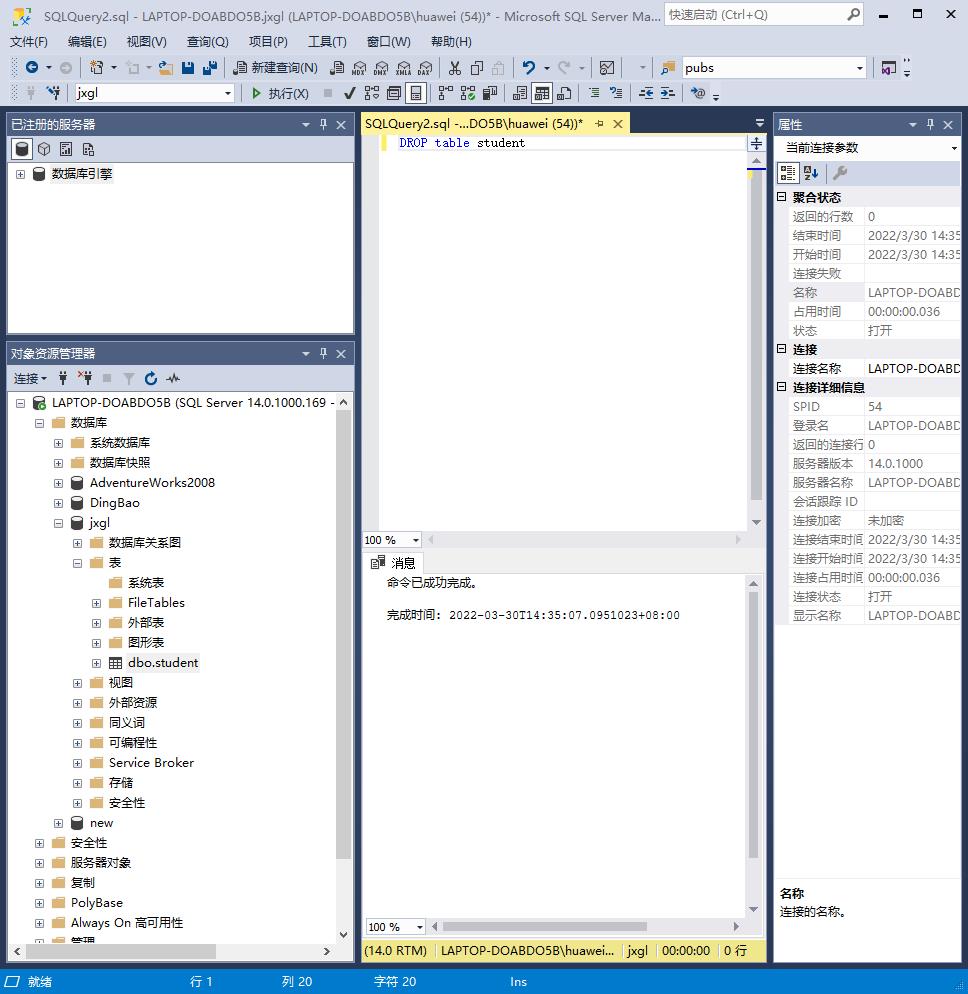
SQL Sever将SQL Sever中的一个数据表的数据导出为insert语句
例如:这SQL Sever中的一张数据表,想要将这张数据表中的数据 转化成一个一个的insert语句存储在txt的文档中,那么不论走到那里这个insert语句一执行,我们就能将这个数据表中的数据插入到另一个地方了。

1》在新建查询中,创建一个对象,这个对象就是用来产生这个对象的,名字叫proc_insert,我们可以创建多个不重名的对象,当然也可以删除这个对象。

1 create proc proc_insert (@tablename varchar(256)) 2 as 3 begin 4 set nocount on 5 declare @sqlstr varchar(4000) 6 declare @sqlstr1 varchar(4000) 7 declare @sqlstr2 varchar(4000) 8 select @sqlstr=\'select \'\'insert \'+@tablename 9 select @sqlstr1=\'\' 10 select @sqlstr2=\' (\' 11 select @sqlstr1= \' values ( \'\'+\' 12 select @sqlstr1=@sqlstr1+col+\'+\'\',\'\'+\' ,@sqlstr2=@sqlstr2+name +\',\' from (select case 13 -- when a.xtype =173 then \'case when \'+a.name+\' is null then \'\'NULL\'\' else \'+\'convert(varchar(\'+convert(varchar(4),a.length*2+2)+\'),\'+a.name +\')\'+\' end\' 14 when a.xtype =127 then \'case when \'+a.name+\' is null then \'\'NULL\'\' else \'+\'convert(varchar(20),\'+a.name +\')\'+\' end\' 15 when a.xtype =104 then \'case when \'+a.name+\' is null then \'\'NULL\'\' else \'+\'convert(varchar(1),\'+a.name +\')\'+\' end\' 16 when a.xtype =175 then \'case when \'+a.name+\' is null then \'\'NULL\'\' else \'+\'\'\'\'\'\'\'\'\'+\'+\'replace(\'+a.name+\',\'\'\'\'\'\'\'\',\'\'\'\'\'\'\'\'\'\'\'\')\' + \'+\'\'\'\'\'\'\'\'\'+\' end\' 17 when a.xtype =61 then \'case when \'+a.name+\' is null then \'\'NULL\'\' else \'+\'\'\'\'\'\'\'\'\'+\'+\'convert(varchar(23),\'+a.name +\',121)\'+ \'+\'\'\'\'\'\'\'\'\'+\' end\' 18 when a.xtype =106 then \'case when \'+a.name+\' is null then \'\'NULL\'\' else \'+\'convert(varchar(\'+convert(varchar(4),a.xprec+2)+\'),\'+a.name +\')\'+\' end\' 19 when a.xtype =62 then \'case when \'+a.name+\' is null then \'\'NULL\'\' else \'+\'convert(varchar(23),\'+a.name +\',2)\'+\' end\' 20 when a.xtype =56 then \'case when \'+a.name+\' is null then \'\'NULL\'\' else \'+\'convert(varchar(11),\'+a.name +\')\'+\' end\' 21 when a.xtype =60 then \'case when \'+a.name+\' is null then \'\'NULL\'\' else \'+\'convert(varchar(22),\'+a.name +\')\'+\' end\' 22 when a.xtype =239 then \'case when \'+a.name+\' is null then \'\'NULL\'\' else \'+\'\'\'\'\'\'\'\'\'+\'+\'replace(\'+a.name+\',\'\'\'\'\'\'\'\',\'\'\'\'\'\'\'\'\'\'\'\')\' + \'+\'\'\'\'\'\'\'\'\'+\' end\' 23 when a.xtype =108 then \'case when \'+a.name+\' is null then \'\'NULL\'\' else \'+\'convert(varchar(\'+convert(varchar(4),a.xprec+2)+\'),\'+a.name +\')\'+\' end\' 24 when a.xtype =231 then \'case when \'+a.name+\' is null then \'\'NULL\'\' else \'+\'\'\'\'\'\'\'\'\'+\'+\'replace(\'+a.name+\',\'\'\'\'\'\'\'\',\'\'\'\'\'\'\'\'\'\'\'\')\' + \'+\'\'\'\'\'\'\'\'\'+\' end\' 25 when a.xtype =59 then \'case when \'+a.name+\' is null then \'\'NULL\'\' else \'+\'convert(varchar(23),\'+a.name +\',2)\'+\' end\' 26 when a.xtype =58 then \'case when \'+a.name+\' is null then \'\'NULL\'\' else \'+\'\'\'\'\'\'\'\'\'+\'+\'convert(varchar(23),\'+a.name +\',121)\'+ \'+\'\'\'\'\'\'\'\'\'+\' end\' 27 when a.xtype =52 then \'case when \'+a.name+\' is null then \'\'NULL\'\' else \'+\'convert(varchar(12),\'+a.name +\')\'+\' end\' 28 when a.xtype =122 then \'case when \'+a.name+\' is null then \'\'NULL\'\' else \'+\'convert(varchar(22),\'+a.name +\')\'+\' end\' 29 when a.xtype =48 then \'case when \'+a.name+\' is null then \'\'NULL\'\' else \'+\'convert(varchar(6),\'+a.name +\')\'+\' end\' 30 -- when a.xtype =165 then \'case when \'+a.name+\' is null then \'\'NULL\'\' else \'+\'convert(varchar(\'+convert(varchar(4),a.length*2+2)+\'),\'+a.name +\')\'+\' end\' 31 when a.xtype =167 then \'case when \'+a.name+\' is null then \'\'NULL\'\' else \'+\'\'\'\'\'\'\'\'\'+\'+\'replace(\'+a.name+\',\'\'\'\'\'\'\'\',\'\'\'\'\'\'\'\'\'\'\'\')\' + \'+\'\'\'\'\'\'\'\'\'+\' end\' 32 else \'\'\'NULL\'\'\' 33 end as col,a.colid,a.name 34 from syscolumns a where a.id = object_id(@tablename) and a.xtype <>189 and a.xtype <>34 and a.xtype <>35 and a.xtype <>36 35 )t order by colid 36 37 select @sqlstr=@sqlstr+left(@sqlstr2,len(@sqlstr2)-1)+\') \'+left(@sqlstr1,len(@sqlstr1)-3)+\')\'\' from \'+@tablename 38 -- print @sqlstr 39 exec( @sqlstr) 40 set nocount off 41 end 42 go
2》执行这个对象,让他产生insert语句

1 exec proc_insert p_phone;
效果如下:

3》第一步全选,第二步将结果另存为
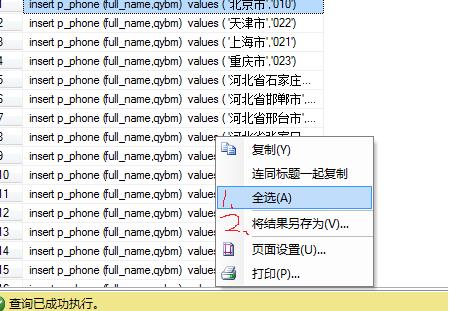
4》这样就生成了一个文本文件了
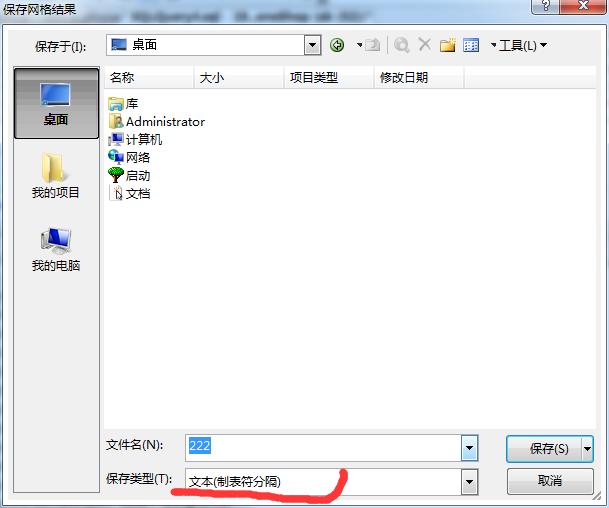
5》如果这里面的id是自增的,或者不想让某一列插入,那就将这些代码放在word中进行替换。
END----
以上是关于数据库入门(SQL SEVER)之SQL语句删除单行数据,所有行数据,表和数据库的主要内容,如果未能解决你的问题,请参考以下文章
